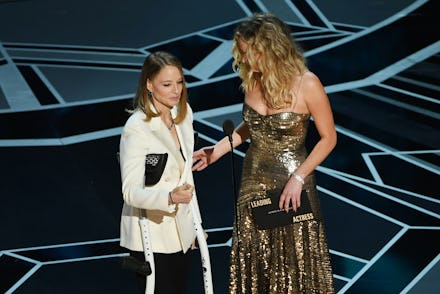Here’s how the Academy Awards handled Casey Affleck’s absence

It’s become an Oscars tradition to have the best actor and best actress winners from the previous year present those awards at every new ceremony: The best actor from the previous year presents to the current year’s best actress and the previous year’s best actress presents to the new best actor. But on Sunday night, Casey Affleck, who won the 2017 best actor award for his role in the drama Manchester by the Sea, was absent from the show.
Instead, Jennifer Lawrence and Jodie Foster presented the best actress award to winner Frances McDormand, who won for her role in Three Billboards Outside Ebbing, Missouri. When they took the stage together, Foster and Lawrence praised took a moment to praise trailblazing women of Hollywood for carving out a place in the industry. McDormand, in her acceptance speech, turned her own win into a powerful moment of celebration for all the women nominees in the audience — she asked them all to stand as the room applauded.
News first broke that Affleck would not serve as a presenter at the 2018 Academy Awards in January, when Deadline reported that Affleck, who had previously been accused of sexual harassment and misconduct, had withdrawn from presenting allegedly because he “did not want to become a distraction.”
A representative for Affleck later confirmed that the actor would not present at Sunday night’s ceremony and planned to skip the event altogether. In a statement responding to Affleck’s decision, an academy spokesperson told the Los Angeles Times, “We appreciate the decision to keep the focus on the show and on the great work of this year.” The news that Lawrence and Foster would replace Affleck as presenters at the ceremony was first announced earlier in March.
In 2010, Affleck settled sexual harassment lawsuits brought against him by cinematographer Magdalena Górka and producer Amanda White, two women he worked with on the set of I’m Still Here, a mockumentary starring Joaquin Phoenix and directed and co-written by Affleck.
Among the complaints were allegations that Affleck had made sexually explicit comments on set, had told a camera operator to show one of the women his genitals and had grabbed one of them threateningly when she refused to share a hotel room with him. Górka alleged in her complaint that, at one point during filming when some of the cast and crew were staying in an apartment together, she woke up in the night to find Affleck in bed with her.
Affleck’s choice to bow out of presenting at the Oscars came after months of backlash to his presumed inclusion. A change.org petition started in October, calling on academy president John Bailey not to invite Affleck to present at the Oscars, got nearly 20,000 signatures.
Hollywood’s tacit acceptance of abusive behavior has come out of the shadows and into the spotlight in recent months, with the wave of #MeToo stories and allegations made against powerful figures in the industry. In January, organizers announced the Time’s Up initiative, a wide-ranging endeavor to combat sexual harassment across multiple industries, including Hollywood. At the Golden Globes in January, stars donned “Time’s Up” pins and wore black to show support for the effort.
But even before sexual assault in the entertainment world had become a center-stage issue, the past allegations against Affleck had already inspired at least one small act of protest against his presence at the Oscars. Actress Brie Larson, who presented Affleck with his best actor Oscar in 2017, hugged Affleck but notably declined to clap for him while she stood onstage during his win. Larson later told Vanity Fair that “whatever it was that I did onstage kind of spoke for itself.”